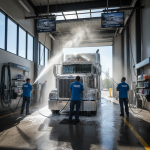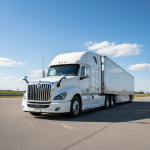Keeping trucks and trailers clean might seem like a mundane task, but it plays a crucial role in maintaining a successful fleet. Trucks and trailers are constantly exposed to harsh weather conditions, dirt, and debris on the road, which can not only affect their appearance but also lead to significant damage and costly repairs. In fact, keeping a regular fleet wash policy is not just a matter of aesthetics, but a smart business decision.
A clean and well-maintained fleet not only enhances the company’s image and professionalism but also extends the lifespan of the vehicles. By implementing a regular fleet wash policy, companies can prevent rust, corrosion, and other issues caused by accumulated dirt and debris. This not only reduces the risk of breakdowns and unexpected downtime but also helps maintain the resale value of the trucks and trailers.
Moreover, a clean fleet can have a positive impact on driver morale and customer perception. Drivers are more likely to take pride in driving clean vehicles, which can enhance their job satisfaction and productivity. Customers also appreciate clean trucks, as it reflects on the company’s commitment to quality and attention to detail.
Investing in a regular fleet wash policy is a small but significant step towards ensuring the long-term success and profitability of any trucking business.
Importance of maintaining a clean fleet
A well-maintained and clean fleet of trucks and trailers is essential for any successful trucking business. The vehicles that make up a company’s fleet are not only a significant investment but also a reflection of the organization’s professionalism and attention to detail. Keeping these assets in pristine condition is crucial for several reasons.
Firstly, a clean fleet enhances the company’s image and reputation. Customers and potential clients are more likely to trust and do business with a company that takes pride in the appearance of its vehicles. A clean, well-maintained fleet conveys a sense of reliability, attention to detail, and commitment to quality. This can be particularly important in industries where first impressions and visual appeal play a significant role in the decision-making process.
Moreover, a clean fleet can have a positive impact on driver morale and job satisfaction. Drivers who operate well-maintained vehicles are more likely to take pride in their work and feel valued by the company. This can lead to improved job performance, reduced turnover, and a more engaged and motivated workforce. A happy and satisfied driver workforce can be a significant competitive advantage in the trucking industry.
Benefits of implementing a regular fleet wash policy
Implementing a regular fleet wash policy can provide numerous benefits to a trucking business. One of the most significant advantages is the protection of the vehicles’ resale value. Trucks and trailers that are well-maintained and kept clean tend to retain their value better than those that have been neglected. This can be particularly important when it comes time to sell or trade-in the vehicles, as a higher resale value can translate to a better return on the initial investment.
In addition to protecting resale value, a regular fleet wash policy can also help extend the lifespan of the vehicles. Accumulated dirt, debris, and environmental contaminants can lead to rust, corrosion, and other forms of damage that can shorten the useful life of a truck or trailer. By regularly removing these harmful elements through a comprehensive cleaning process, companies can help prevent costly repairs and prolong the overall lifespan of their fleet.
Furthermore, a clean fleet can contribute to improved fuel efficiency. When vehicles are free from accumulated dirt and debris, they are able to operate more smoothly and with less resistance, which can result in better fuel economy. This can translate to significant cost savings over time, as fuel expenses are a major component of the operating costs for any trucking business.

Common challenges in maintaining fleet cleanliness
Maintaining a clean fleet of trucks and trailers can be a challenging task, as these vehicles are constantly exposed to a variety of environmental factors that can compromise their appearance and condition. One of the primary challenges is the harsh weather conditions that trucks and trailers often encounter on the road, including rain, snow, and extreme temperatures.
Another significant challenge is the accumulation of dirt, debris, and other contaminants that can build up on the vehicles over time. This can include everything from road grime and salt to bird droppings and insect remains. These substances can be difficult to remove and can lead to the development of rust, corrosion, and other forms of damage if left unchecked.
Additionally, the sheer size and complexity of a fleet can make it challenging to maintain consistent cleanliness across all vehicles. Coordinating regular cleaning schedules, ensuring the availability of the necessary equipment and supplies, and training employees on proper cleaning techniques can all be time-consuming and resource-intensive tasks.
Steps to develop an effective fleet wash policy
Developing an effective fleet wash policy is crucial for maintaining the cleanliness and longevity of a company’s trucks and trailers. The first step in this process is to conduct a thorough assessment of the current state of the fleet, including the condition of each vehicle and the existing cleaning practices.
Once the baseline has been established, the next step is to create a comprehensive cleaning schedule that outlines the frequency and scope of the required cleaning tasks. This may involve daily spot-cleaning, weekly or bi-weekly full-service washes, and more extensive deep-cleaning sessions at regular intervals.
It’s also important to establish clear guidelines and protocols for the fleet wash process, including the use of specific cleaning products, equipment, and techniques. This can help ensure consistency and quality across the entire fleet, while also minimizing the risk of damage or ineffective cleaning.
Choosing the right cleaning products and equipment
Selecting the right cleaning products and equipment is essential for maintaining the effectiveness and efficiency of a fleet wash policy. When it comes to cleaning solutions, it’s important to choose products that are specifically designed for use on commercial vehicles, as they may have different chemical compositions and application requirements compared to standard household cleaners.
In addition to the cleaning products themselves, the equipment used for the fleet wash process is also critical. This may include high-pressure washers, brushes, and other specialized tools that can effectively remove stubborn dirt, grime, and other contaminants from the vehicles. It’s important to invest in quality equipment that can withstand the rigors of frequent use and provide consistent, reliable performance.
Another important consideration is the availability and accessibility of the necessary cleaning supplies and equipment. Ensuring that these resources are readily available and easily accessible to the cleaning crew can help streamline the fleet wash process and minimize downtime.

Training employees on fleet cleaning procedures
Effective employee training is a crucial component of a successful fleet wash policy. Properly trained employees can help ensure that the cleaning process is carried out consistently and efficiently, while also minimizing the risk of damage to the vehicles.
The training program should cover a range of topics, including the proper use of cleaning products and equipment, safety protocols, and best practices for maintaining a clean and well-organized work environment. Employees should also be trained on the specific cleaning techniques and procedures that are tailored to the company’s fleet, such as the appropriate methods for washing different types of vehicles or addressing specific problem areas.
In addition to the initial training, it’s important to provide ongoing support and refresher courses to ensure that employees remain up-to-date on the latest cleaning methods and technologies. This can help maintain a high level of quality and consistency in the fleet wash process, while also promoting a culture of continuous improvement and professional development.
Outsourcing fleet cleaning services
While many companies choose to handle their fleet cleaning in-house, outsourcing this task to a professional service provider can also be a viable option. Outsourcing can offer several benefits, including access to specialized equipment, expertise, and resources that may be difficult or costly for a company to maintain on its own.
Professional fleet cleaning services often have the necessary equipment, such as high-pressure washers, specialized brushes, and advanced cleaning solutions, to thoroughly clean and maintain the vehicles. They may also have the capacity to handle larger fleets or provide more frequent cleaning services, which can be particularly beneficial for companies with a large number of trucks and trailers.
Additionally, outsourcing fleet cleaning can free up valuable time and resources for the company, allowing them to focus on their core business operations. This can be especially advantageous for smaller or medium-sized trucking companies that may not have the dedicated staff or facilities to handle fleet cleaning in-house.
Case studies on the impact of regular fleet washing
The impact of a regular fleet wash policy can be clearly demonstrated through real-world case studies. One such example is the experience of a mid-sized trucking company that implemented a comprehensive fleet wash program.
Prior to the implementation of the program, the company’s fleet had been plagued by issues such as premature rusting, corrosion, and decreased fuel efficiency. The vehicles were also struggling to maintain a professional appearance, which was negatively impacting the company’s image and reputation among customers.
After implementing a regular fleet wash policy, the company saw a significant improvement in the condition and performance of its vehicles. The regular cleaning helped to remove accumulated dirt and debris, preventing the development of rust and corrosion. This, in turn, led to improved fuel efficiency and a longer lifespan for the trucks and trailers.
Additionally, the company’s fleet presented a more polished and professional appearance, which had a positive impact on customer perception and helped to strengthen the company’s brand. The investment in regular fleet washing ultimately paid off in the form of reduced maintenance costs, improved customer satisfaction, and a stronger competitive position in the market.
Cost savings and ROI of a regular fleet wash policy
Implementing a regular fleet wash policy may require an upfront investment in terms of equipment, supplies, and labor. However, the long-term benefits and cost savings associated with a well-maintained fleet can far outweigh the initial expenses.
One of the most significant cost savings comes from the extended lifespan of the vehicles. By preventing rust, corrosion, and other forms of damage, a regular fleet wash policy can help to prolong the useful life of trucks and trailers, reducing the need for premature replacement or costly repairs.
Additionally, a clean fleet can contribute to improved fuel efficiency, which can translate to substantial cost savings over time. When vehicles are free from accumulated dirt and debris, they are able to operate more smoothly and with less resistance, resulting in better fuel economy.
Furthermore, a well-maintained fleet can also have a positive impact on the company’s insurance premiums and risk profile. Insurers often view companies with a commitment to fleet maintenance and cleanliness as lower-risk, which can lead to more favorable insurance rates and reduced liability exposure.

Conclusion: The long-term benefits of prioritizing fleet cleanliness
Maintaining a clean and well-cared-for fleet of trucks and trailers is not just a matter of aesthetics; it is a strategic business decision that can have far-reaching implications for a company’s success and profitability.
By implementing a regular fleet wash policy, companies can protect their investment in their vehicles, extend their lifespan, and improve their overall performance and efficiency. A clean fleet can also enhance the company’s image and reputation, boost driver morale, and positively impact customer perception.
While the initial investment in a fleet wash program may seem like an additional expense, the long-term benefits and cost savings can be substantial. By prioritizing fleet cleanliness, companies can position themselves for long-term success and ensure that their most valuable assets remain in top condition for years to come.



